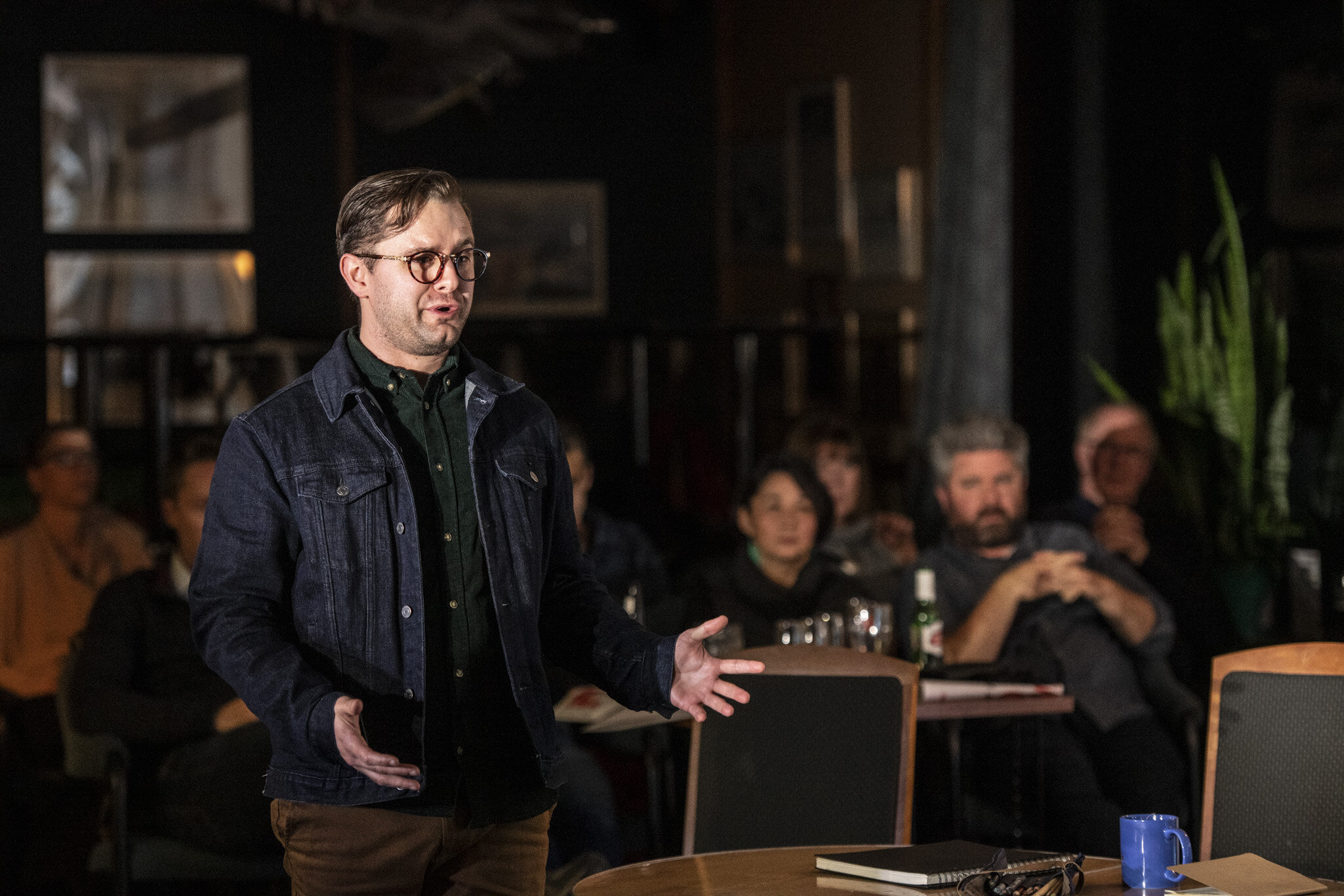Against the Grain Theatre’s ‘La Boheme’. Courtesy of the Banff Centre
(program)
Against The Grain Theatre presented ‘La Boheme’ on Friday October 11th at the Tranzac Club.
Cast:
Marcel d’Entremont -Rodolfo
Jonelle Sills - Mimì
Clarence Frazer - Marcello
Danika Lorèn - Musetta
Andrew Adridge - Schaunard
Giles Tomkins - Colline
Greg Finney - Benoît/Alcindoro
Carl Lyons - Bartender
i enjoy opera but i hope you won’t blame me if i don’t expect to have fun at an opera---at least not the way i might have fun at a sports game or a stand-up comedy show. in this regard, Against the Grain Theatre’s tenth-anniversary production of La Bohème was nothing if not unexpected. chock-full of uproarious laughter, all-too-relatable millennial drama, and larger-than-life vocal performances, the production put forward an invaluable reimagining of the power of opera in contemporary life. even as it reignited opera’s traditional role as a popular cultural juggernaut, it also surpassed and abandoned that tradition to hit a nerve of timeless human feeling that is too often ignored in modern artworks of any genre.
Against the Grain Theatre’s ‘La Boheme’. Courtesy of the Banff Centre
i can’t help but feel like philosophizing about La Bohème puts me in a bit of a bind, since the key to the opera is not to overthink it. while Against the Grain founder and artistic director joel ivany’s translation/adaptation of puccini’s 1896 classic retains much of the plot and poetry of the original (“...in the soft light your eyes are shining like the stars,” sings the romantic protagonist Rodolfo), its pivotal strength is its deflation of the most heroic outpourings of human emotion to the inane stupidity of people-like-me’s everyday existence (Rodolfo again, just moments later: “I am an artist...and am I working? I’m not”).
luckily, embracing the production’s inherent coarseness is easier done in the low-rent performing artists’ haunt of toronto’s Tranzac Club---currently hosting the show’s hometown run following a nine-city cross-country tour---than the columns of a classical music blog (though blue riband’s lack of capitalization does help). by far the show’s strongest moments were those set in the familiar barroom environment, as the opera’s main cast of hipster art-bros and chorus of party girls slipped seamlessly around the taps and clinked glasses with audience members. still, the acts set in the protagonists’ threadbare Annex apartment also kept the immersive energy way up, featuring fluid physical comedy that was both hilariously over-the-top and uncannily naturalistic. special props go to gregory finney for his spot-on comic portrayal of Benoît, the self-obsessed, out-of-touch landlord who doesn’t seem to have changed a bit in over 100 years.
Against the Grain Theatre’s ‘La Boheme’. Courtesy of the Banff Centre
in its heart of hearts, Against the Grain’s La Bohème celebrates the human baseness that underlies our most idealistic endeavours; i can’t overstate, for example, how much i empathized with the characters’ intense unwillingness to read, see, or hear their best friends’ artwork (“how warm your words are,” sings one of Rodolfo’s roommates---but only after they’ve burned his screenplay for heat). strangely, this might be the best way to account for the fantastic impact of the singers’ otherwise competent performances. each voice filled in a different corner of the sonic environment: while jonelle sills (Mimì) struggled to bring excitement to her recitatives, her arias teemed with pathos, ringing both softly and loudly at once; marcel d’entremont’s (Rodolfo) golden voice elevated the libretto with its heroic sway; clarence frazer’s (marcello) striking baritone transported me into another dimension from the very first note. all of them, however, managed to trade the conventional nobility of operatic singing for something more like an animal magnetism, which wholly transformed the space into an awe-inspiring resonating chamber even as it brought out the cast’s mundane caricatures of everyday Annex-dwellers. danika lorèn’s spotlight-stealing portrayal of Musetta provided the best example of this effect; by a seamless blend of her piercingly clear soprano with the gestures of a seductive, spoiled child, she challenged my and the rest of the audience’s sensibilities and self-perceptions on an alarmingly deep level.
Against the Grain Theatre’s ‘La Boheme’. Courtesy of the Banff Centre
overall, the opera succeeded wherever it broke down the distance between audience and performance---and, by extension, between audience and score. it was a special treat hearing the production’s one-pianist orchestra (david eliakis) haggardly flip pages of puccini’s masterpiece, especially when i'd find myself utterly submerged in the otherworldly ensemble of sills’s, d’entremont’s, frazer’s, and lorèn’s voices just moments later. it should be noted that the company couldn’t maintain this brilliant high-low oscillation for the entirety of the show’s 2.5 hours, faltering especially in its surprising misogyny (some of the libretto’s derogatory language felt, to me at least, too sour even for the crassest comedic beats) and in its difficulty modernizing the opera’s final act, in which Mimì dies of undertreated tuberculosis.
at the same time, it feels poignantly wrong trying to tally up the strengths and weaknesses of a performance that made me feel oh-so much, to the extent that the joy, delight, gravity, and recognition my brain might have otherwise distinguished melded into a monolithic gush of sheer life. all criticisms aside, can i have some more of that?
Against the Grain Theatre’s ‘La Boheme’ runs until October 25th at the Tranzac Club.
John Nyman is a poet, critic and scholar from Toronto. In addition to reviewing for Opera Canada and The Dance Current as part of the 2018/19 Emerging Arts Critics program, he has reviewed literature for publications including Broken Pencil and The Puritan as well as visual art for Border Crossings and Peripheral Review.



